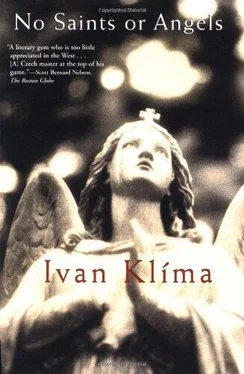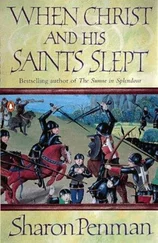'Got a date?'
'Something like that.'
'It's about time too,' Mum says.
'But Mum, I didn't say who I have the date with.'
'I can tell it's with some bloke. Is it serious?'
'I always take everything seriously, Mum.'
'You tell him that, not me,' Mum says, sticking up for the man whose existence she has deduced.
I've no idea what clothes are appropriate to meet people who play at heroes; I've never experienced anything of the sort. Jeans, maybe, but I look better in a skirt. I'll wear the red short-sleeved blouse and a long cotton skirt — as black as my expectations in life. It comes halfway down my calves and at least hides the fact that my legs are already getting thinner. I shouldn't think jewellery is the thing, but I'll wear a thin gold chain so that my neck isn't so bare.
I open the drawer where I hide my valuables; the chain should be lying in a wristwatch box, but it isn't there. I open the other few jewellery cases I own but the chain isn't there either. And in the process I discover that the gold ring I inherited from Grannie Marie is missing. I grow agitated. I'm careful with my things and don't misplace a hankie or a sock, let alone a piece of gold jewellery. Even so I open all the other drawers and rummage in them.
'Looking for something?' Mum wants to know.
'No, not really.'
If a thief had got into the flat, he would definitely have taken something else as well, and we'd certainly have noticed there had been an intruder.
I go into Jana s room, tell her to turn down the racket and ask her whether she didn't borrow some of my jewellery.
I sense a momentary hesitation. 'But Mum, I'd never wear anything like that,' she says, trying to adopt a disdainful tone.
'And how about one of your pals?'
'Mum, what do you take them for?' She knows nothing about my jewellery. 'I'll lend you something if you like,' she suggests.
But I don't want any of her chains or rings.
The thought that my daughter might be capable of stealing from me appals me so much that I prefer not to go into it further.
I go to say goodbye to Mum.
'You're all in a tizzy,' she says, and wishes me a good time.
I'll have a good time, provided I manage to forget that my daughter's probably stealing from me.
Jan is waiting for me outside the Hradčanská metro station. He kisses me and says my outfit suits me. He's glad we'll be together the whole evening. He leads me through the villas of Bubeneč and tries to explain to me the sense of hero games. They are a bit childish, but he thinks that playing games is definitely better than gawking at the television screen, where rival gangs shoot it out, or at the computer screen, where you can make two other gangs shoot at each other. Here you can take part in everything in person; you can encounter dwarves, dragons, vampires, monsters; you can travel wherever you fancy, or go back in time and meet Edison, Jan Žižka or even Napoleon. Most of his friends prefer to be make-believe characters, such as medieval knights or princes, or fight with monsters.
As we're climbing the stairs in the house he has brought me to, he tells me I don't have to join in. I can just watch if I like and ask
questions as a way of getting to know the rules, of which there aren't too many anyway
I don't understand the game, even after it has started; there are too many distractions. It is a large room and the walls are covered in big pictures from which the faces of monsters from comics leer down at me. Quiet, meditational music is heard from hidden speakers. The light shines through a green filter so that we all look as if we are drowned. Apart from Jan and me there are also two girls, some youngster and a large-bellied young man who is introduced to me as Jirka, whom I possibly know by his voice, as he works for radio news. Unfortunately I only listen to Classic FM. One of the girls, who has a visionary gaze, squirrel teeth and long legs, is called Věra. She can't be more than twenty. I don't manage to catch the name of the other girl; recently I've been finding it increasingly difficult to remember people's names. But names aren't important. Anyway nobody here remains the person they are; instead they become someone they possibly want to be. It ought to appeal to me: I've always wanted to live a different life from the one I lived. Karel Čapek wrote a novel about it. People live only one of many possible lives and usually it is one that they are least happy with. The trouble is that the lives they offer me here don't attract me.
Jan recaps the situation that they are all supposed to accept. 'It's 1437,' he says, maybe on my behalf too. 'Sion Castle is under siege. Jirka — Jan Roháč — has already been resisting the troops of Hynek Ptáček for four months.' The youngster, who has apparently been reincarnated as the leader of the besiegers, stands and bows. 'Master Roháč is unaware,' Jan continues his explanation, 'that Ptácek's people are digging an underground passage in order to penetrate the castle. Eliška,' he says, indicating the long-legged girl, 'whose brother is in the castle, manages to ingratiate herself with Master Ptáček and discover his plans. Last time she was given the task of finding a way to get into the castle with this important information.'
'I've one question,' the fat one says. 'What's the water situation in the castle? Could I fill the moat?'
Jan declares that something like that is out of the question. There is scarcely enough water to drink. But the moat is deep and steep enough to offer sufficient protection, he assures his tubby companion.
From what I can see, it's clear that my lover is the game's director or whatever, whose job is to set the scene for the other participants and describe the period they are about to enter. He offers them roles and skilfully asks them questions about how they'd behave in certain situations, and on the basis of that he determines how well they have fared. That's most likely the reason he brought me here, so that I should see how he holds sway and so that he can demonstrate his knowledge. I'm touched. But the game is very slow to get off the ground, and while the leggy creature tries to think up ways of getting into the besieged castle, my mind wanders back to our flat and I try to work out whether my own daughter stole from me or whether she simply enabled some of her pals to do it.
They offer me some refreshments but I decline; I don't feel like food. I let them pour me some wine although just lately wine tends to depress me. The fact is I'm out of place here. All the people here are very young, so young, in fact, that I'm scarcely aware of anything but my age and not belonging here. They are all young enough to be my children, including my lover. They enjoy playing games. They can take delight in being part of an imaginary world; so far nothing in real life is a real burden on them, and even if it is, they still have strength enough to put up with it.
I watch the long-legged visionary, who is supposed to deliver the important message. I'm not interested in what she'll do, I'm noticing how adoringly she gazes at my lover, while looking at me out of the corner of her eye. I don't appeal to her, I don't belong here; I don't even belong to the one who brought me here. She is more likely to belong to him than I am, of course. And most likely on the way out she tries to ingratiate herself with him, to nesde up
to him in the gloomy passageway and thrust herself into his arms. And why shouldn't he take her in his arms and kiss her, when she lets him, when she asks for it?
If anything, my life is now headed for the finishing line whereas his is only just picking up speed. I fight for breath when I'm climbing stairs, he just soars through the air, waving invisible wings as he hovers above me. Other times he just leaps ahead and in a single leap covers ten miles.
Читать дальше












